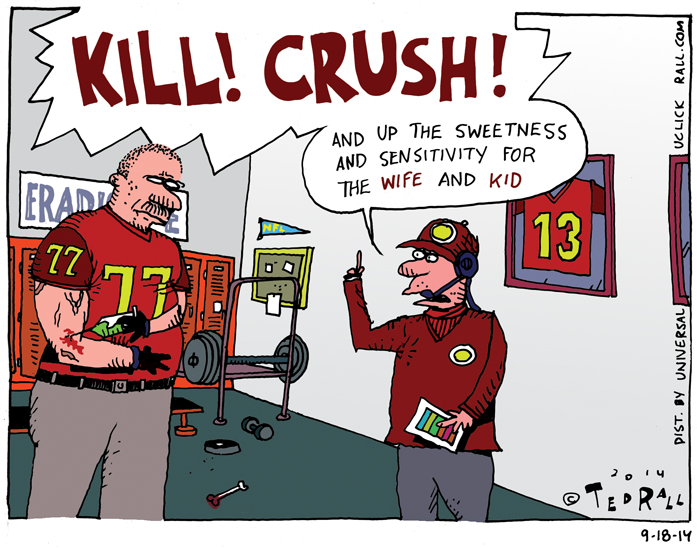 aNewDomain commentary — In this exclusive column for aNewDomain, our Ted Rall says firing Ray Rice for beating his wife was too harsh — and, in some ways, too lenient. Here’s why.
aNewDomain commentary — In this exclusive column for aNewDomain, our Ted Rall says firing Ray Rice for beating his wife was too harsh — and, in some ways, too lenient. Here’s why.
The release of an elevator security video showing the brutal assault of a woman by the NFL football player who later married her prompted his team, the Baltimore Ravens, to revisit its prior penalty of a two-game suspension. Now it is dishing out what looks to be a full-fledged and de facto dismissal.
Most of the public agreed with his sacking. Ray Rice’s attack on his future wife was unbelievably violent. Not only did he knock her out cold, but then he dragged her unconscious form out of the elevator like a sack of potatoes.
The NFL sanctions against Rice do mark a change in policy, as the New York Times noted:
Across professional sports, it is hardly unusual for athletes to be involved in domestic abuse cases, but seldom have they faced meaningful punishment from their employers. Teams and leagues have generally demurred, noting that there is a presumption of innocence and that it is not their role to supersede the criminal justice system.”
To this, most people seem to think it’s about time. In her comments, Ruth Glenn of the National Coalition Against Domestic Violence reflected the national mood. She said:
[Professional sports leagues] need to demonstrate to society that there is zero tolerance against domestic violence. Changing culture takes a while. But you have to start somewhere.”
Spousal abuse seems to have risen higher than child abuse on the rage meter. Just a few days after the Ray Rice scandal broke, another professional football player, Minnesota Vikings running back Adrian Peterson, was indicted for child abuse in the caning of his four-year-old son in Texas.
Peterson remained on the team roster. At a news conference, Vikings general manager Rick Spielman tried to explain:
Based on the extensive information we have right now, and what we know about Adrian not only as a person but what he has also done for this community, we believe he deserves to play while the legal process plays out … at the same time, we must defer to the legal system to determine whether he went too far. But we cannot make that judgment.”
It’s curious.
The difference in the way these two cases were handled strikes me as both inconsistent and worrisome. First the inconsistent part: In both instances, a highly paid professional athlete brutalized a family member who couldn’t defend himself or herself.
But only the guy who actually wasn’t charged with a crime by any legal entity got fired.
Not to diminish what Ray Rice did. No matter what his future wife said or did to provoke him, there can be no excuse whatsoever for his actions. He is a dangerous man. I wouldn’t have any problem with the jury determining that he ought to be removed from the street and placed behind bars. But that’s the trouble. There has been no such legal process. In the United States, we don’t convict people of crimes based on security tapes.
What’s worrisome is the suggestion by online “social justice warriors” and countless opinion mongers in the media that employers ought to wield this much power.
We already live in a country in which unions have been eviscerated and the balance of power between labor and management has tilted radically to the former at the expense of the latter. Workers toil under the terror of at-will employment laws that allow employers to hire and fire at will, and may let people go for pretty much any reason, including not liking the cut of their jib.
Do we really want to add to that outsized power the role that is properly played by a jury of one’s peers, the right to try, convict and sentence a citizen for his crimes?
Professional athletes have morals clauses in their contracts, so generally speaking, leagues like the NFL are usually within their legal rights to fire athlete employees who behave badly although, in Rice’s case, he may have grounds to challenge his dismissal based on an anti-double jeopardy clause in his contract.
As I see it, the problem is with a public that not only thinks that losing your job is an appropriate punishment for beating up your partner, but seems satisfied that loss of employment – rather than jail and/or a fine – is sufficient.
For aNewDomain, I’m Ted Rall.
Based in New York, our Ted Rall is a Pulitzer Prize finalist who writes and draws about politics and culture here at aNewDomain. Check out his blog at rall.com and look for his new book, After We Kill You, We Will Welcome You Back as Honored Guests: Unembedded in Afghanistan. Follow him @tedrall and interact him at his Google+ page.













